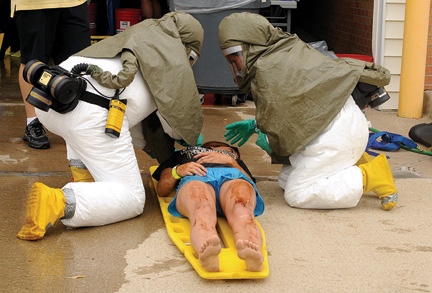Decontamination Class Offered at TCHS
Local health care and emergency service professionals, as well as those from several other professions, came from all over the state came to train at Thayer County Health Services (TCHS) last Wednesday and Thursday. Bill McPherson, the Thayer County emergency preparedness director was among them.
Their focus: hazmat safety and response.
The Hospital First Receiver Course worked with health professionals on how to properly handle situations involving hazardous and toxic materials.
“The most common for them to see around here is farm chemicals,” said Barb Dodge, a course instructor and director of hospital preparedness from the University of Nebraska Medical Center.
One class is especially important: the decontamination course.
The course is meant to instruct trainees how to react in the event of a patient(s) showing up with chemicals on them.
According to Dodge, because of the expenses, only three of these classes are offered a year.
“It’s a big commitment for the hospital,” she said. “It’s a big commitment to preparedness.”
“Before [the patients] ever go in the emergency room, they have to be decontaminated or you’ve just exposed everyone in your emergency room,” said Deb Aaron, emergency preparedness director at TCHS.
Trainees suited up from head to toe before the activity began to prevent any skin-to-skin contact with the patients. They wore gas masks and duct taped their gloves and rubber shoes to the rest of their suits.
“We have to keep staff safe first or they can’t take care of patients,” said Dodge.
“Victims,” covered in a dark mystery liquid, approached the suited trainees. Some of the volunteer victims were screaming. Others held child-size blow-up dolls out to the trainees asking them to “save their baby.”
The volunteers were given bright yellow bracelets and had to remove all clothing before stepping into nearby tents for the next phase. The volunteers wore swimsuits underneath their clothes.
While in the tents, the victims were immediately rinsed off so all traces of chemicals were removed from their skin and hair.
In the background, Sharon Vandergriff, the decon team leader, shouted instructions and questions from a megaphone.
“It teaches them the importance of recognizing chemicals before it gets in,” said Dodge, who also provided support and instruction from the sidelines. “That’s the goal.”
Other courses offered during those two days included hazmat, hazmat response, and identification and hazard assessment.
“An important part of health care is being prepared for disasters,” said Aaron.

